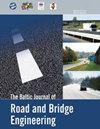城市道路管理系统路面性能模型比较
IF 1.1
4区 工程技术
Q4 ENGINEERING, CIVIL
引用次数: 1
摘要
有效的路面管理系统(PMS)的关键因素是及时的养护和修复活动,这些活动为驾驶员的安全、舒适、预算和对环境的影响带来了好处。为了合理规划养护和修复活动,使用了路面性能模型。路面性能模型通常基于农村道路的损伤和破损观测,可用于预测城市道路的性能。然而,在将与交通量、速度和负荷、气候条件和维护相关的参数添加到城市道路的PMS中之前,必须对其进行调整。本研究的主要目的是确定维尔纽斯城市道路的性能指标,并提出建立路面状况的方法。为了实现这一目标,在两年内对15条在役城市道路的病害(车辙深度和裂缝)、承载力和国际粗糙度指数(IRI)进行了测量。用路面试验机(RST)采集路面病害、车辙深度和IRI,用落锤式弯沉仪(FWD)测定路面结构承载力。将测量到的损伤与研究中确定的阈值进行比较。根据测量数据,确定了使用两种方法的组合路面状况指数,以及每条道路的全局状况指数。根据这些标准,对分析的道路进行了优先维护和修复。基于研究结果,强调了对PMS进行进一步路面状况监测和路面性能模型实施的建议。本文章由计算机程序翻译,如有差异,请以英文原文为准。
Comparison of Pavement Performance Models for Urban Road Management System
The key factors for effective pavement management system (PMS) are timely preservation and rehabilitation activities, which provide benefit in terms of drivers’ safety, comfort, budget and impact on the environment. In order to reasonably plan the preservation and rehabilitation activities, the pavement performance models are used. The pavement performance models are usually based on damage and distress observations of rural roads, and can be applied to forecast the performance of urban roads. However, the adjustment of the parameters related to traffic volume, speed and load, climate conditions, and maintenance has to be made before adding them to PMS for urban roads. The main objective of this study is to identify the performance indicators and to suggest pavement condition establishment methodology of urban roads in Vilnius. To achieve the objective, the distresses (rut depth and cracks), bearing capacity, and international roughness index (IRI) were measured for fifteen urban roads in service within a two-year period. The distresses, rut depth and IRI were collected with the Road Surface Tester (RST) and bearing capacity of pavement structures were measured with a Falling Weight Deflectometer (FWD). The measured distresses were compared to the threshold values identified in the research. According to the measured data, the combined pavement condition indices using two methodologies were determined, as well as a global condition index for each road. The analysed roads were prioritized for maintenance and rehabilitation in respect to these criteria. Based on the research findings, the recommendations for further pavement condition monitoring and pavement performance model implementation to PMS were highlighted.
求助全文
通过发布文献求助,成功后即可免费获取论文全文。
去求助
来源期刊
CiteScore
2.10
自引率
9.10%
发文量
25
审稿时长
>12 weeks
期刊介绍:
THE JOURNAL IS DESIGNED FOR PUBLISHING PAPERS CONCERNING THE FOLLOWING AREAS OF RESEARCH:
road and bridge research and design,
road construction materials and technologies,
bridge construction materials and technologies,
road and bridge repair,
road and bridge maintenance,
traffic safety,
road and bridge information technologies,
environmental issues,
road climatology,
low-volume roads,
normative documentation,
quality management and assurance,
road infrastructure and its assessment,
asset management,
road and bridge construction financing,
specialist pre-service and in-service training;

 求助内容:
求助内容: 应助结果提醒方式:
应助结果提醒方式:


